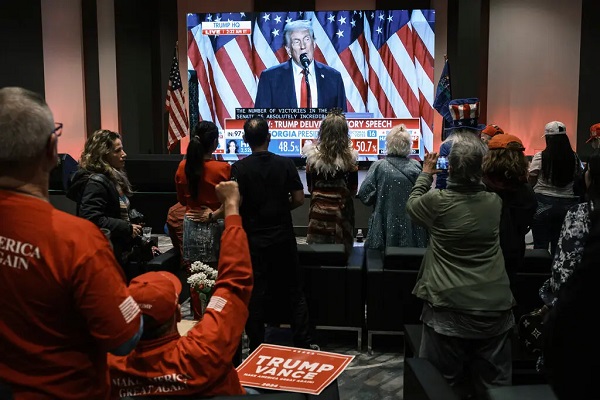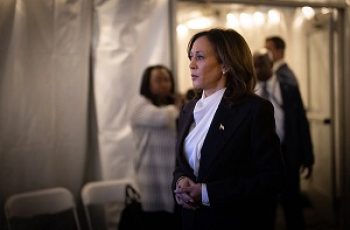Ad Blocker Detected
Our website is made possible by displaying online advertisements to our visitors. Please consider supporting us by disabling your ad blocker.
Trump’s Bold Ethics Move: How He Held Up Biden’s Transition Process
Trump’s Bold Ethics Move: How He Held Up Biden’s Transition Process, Donald J. Trump, the president-elect, has not turned in the mandatory ethics plan that outlines his commitment to avoiding conflicts of interest.

President-elect Donald J. Trump’s transition team has refused to participate in the normal handoff process, which typically begins months before the election.Credit…Jordan Gale for The New York Times
There are concerns that the smooth transition to power may be hampered by President-elect Donald J. Trump’s reluctance to file a legally required ethics pledge, which would bind him to abstaining from conflicts of interest and other ethical dilemmas while in office.
Mr. Trump’s transition team was required by the Presidential Transition Act to submit the ethics plan by October 1.
The transition team’s leadership has privately drafted an ethics code and a conflict-of-interest statement that govern its staff, but the documents don’t contain legally required wording that outlines Mr. Trump’s strategy for dealing with conflicts of interest while in office.
Since Mr. Trump formed his transition team in August, it has not participated in the traditional handoff process, which often begins months before the election.
It has consistently neglected to sign the required contracts that govern the process. Mr. Trump’s transition team has been unable to participate in national security briefings or visit federal agencies as they begin the challenging process of preparing to take over the nation on January 20, 2025.
Transition planning is a private process, but it is closely tied to our government’s actions and how public funds are managed, said Max Stier, president and chief executive officer of the Partnership for Public Service, a nonpartisan group that provides resources to candidates through the Center for Presidential Transition. “That task depends on avoiding conflicts of interest and avoiding the appearance of conflicts of interest.”
Trump’s Bold Ethics Move: How He Held Up Biden’s Transition Process
White House press secretary Karine Jean-Pierre said Thursday that President Biden’s chief of staff had reached out to the Trump transition team. Although they did not say when, the team’s officials “state they have an intent” to sign the agreements.
Last month, the Trump transition team leaders said they would complete the required memorandums of understanding with the General Services Administration and the White House. Furthermore, “all transition staff have signed a robust ethics pledge as a requirement of their participation,” the transition co-chairs, Howard Lutnick and Linda McMahon, said in a statement.
A spokesman for the Trump transition team did not respond to a request for comment.
The Presidential Transition Act governs the complex process of handing over the byzantine operations of the federal government to a new executive in the two and a half months between Election Day and Inauguration Day.
In 2019, Congress amended that law to require candidates to create and publicly post an ethics plan before the election and to “include information on how eligible presidential candidates will address their own conflicts of interest during a presidential term.”
Concerns about moral dilemmas during the first Trump administration contributed to the creation of that bipartisan statute.
Mr. Trump stated just before he took office that he would not sell his assets or put them in a blind trust, even though his appointees had to abide by ethical standards.
Since then, a Washington-based watchdog group called Citizens for Responsibility and Ethics has uncovered more than 3,400 conflicts of interest linked to Mr. Trump during his first term, including hosting political rallies and hosting foreign dignitaries at hotels and resorts owned by his company.
Also Read: The Importance of the U.S. Election to the Global Community
In an effort to “avoid both actual and apparent conflicts of interest,” Mr. Biden and Vice President Kamala Harris both publicized and submitted ethics agreements as part of their respective transition efforts. They promptly signed the memorandums of understanding as well.
The ethics docs from the Trump transition say nothing about Mr. Trump’s moral behavior.
In a letter to Mr. Trump last month, Maryland Democrat Representative Jamie Raskin insisted that he adhere to the legal requirements of the Presidential Transition Act, saying, “He’s completely thumbing his nose at the idea that all Americans are participating in the same basic public enterprise.”
Of particular note, Mr. Raskin said, was the fact that Mr. Trump’s transition team blew past the Sept. 1 deadline to sign the agreement with the General Services Administration. That document provides for a variety of services to be made available to the president-elect, including $7.2 million in funding for the costs of transition. But it also puts a $5,000 cap on individual donations to the transition and requires the public disclosure of all its donors.
By refusing to sign that agreement, Mr. Trump effectively faces no limit on contributions and does not need to name his donors publicly. Money raised by the transition is not regulated by any other government agency.
Trump’s Bold Ethics Move: How He Held Up Biden’s Transition Process
The other memorandum of agreement with the White House is a different matter. It establishes, among other things, the terms under which the current administration may provide the team of the incoming president with confidential government material.
The Biden administration is constitutionally prohibited from giving it the security clearances required to discuss national defense briefings and classified intelligence until the Trump transition signs that document, Mr. Stier said. Additionally, it does not permit transition personnel to examine their files or have physical access to the 438 federal agencies that they will soon be in charge of.
But according to the law, that deal cannot be signed until the White House receives and posts an ethics plan that complies with federal regulation. This creates a sort of chicken game between the departing Biden administration and the incoming Trump transition.
Mr. Trump’s administration would have to take over the whole federal government without hesitation if no side blinked. According to Mr. Stier, that might make the nation vulnerable at a crucial time.
“There are serious repercussions,” Mr. Stier stated. “On Day 1, it would be impossible to be prepared to govern.”

